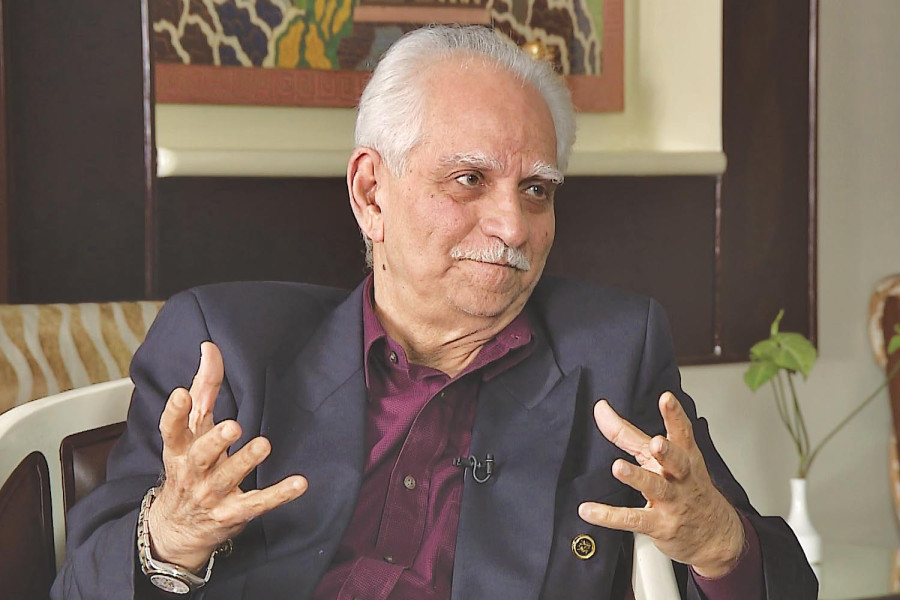Movies
Many Indians will want to come to Nepal after watching ‘Uunchai’
The legendary Bollywood director Ramesh Sippy on Nepal’s potential as a destination for Indian filmmakers and the trend of Bollywood movies not doing well at the box office.
Himendra Mohan Kumar
The success of the Hindi film 'Uunchai', which was extensively shot in Nepal, is likely to bring in more filmmakers from India, said the iconic filmmaker Ramesh Sippy, who has directed all-time Bollywood cult classics like 'Sholay', 'Shaan', 'Shakti', and 'Seeta aur Geeta'.
"If the production is a joint venture, it would work even better. I am sure those involved in Nepal's tourism industry would like many more people to come to the country for shootings. If they extend all the facilities here to our filmmakers, it will become even more viable," said Sippy in an interview with the Post during his recent Kathmandu trip.
Sippy said Indian filmmakers are always on the lookout for beautiful locations and countries where the shoots are relatively cheap, as live shootings these days are quite expensive. Nepal offers filmmakers both these options.
"'Uunchai' was shot here very beautifully. Many people will want to come to Nepal after seeing the film. More importantly, the coming together of talents of both India and Nepal is important," he said.
Sippy said the younger generations in both countries seem to be "raring to go". "It's not like they don't want to. But, one has to find stories that work for both Nepal and India. That's where collaborations can happen. If we try to bring in storylines that connect with people here in Nepal as well as in India, it is not difficult."
Previously, the legendary actor and director Dev Anand had shot his blockbuster films 'Johny Mera Naam' and 'Hare Rama Hare Krishna', in Nepal. In more recent times, the Akshay Kumar starrer 'Baby' was shot in the country.
Sippy said the craft of filmmaking has changed tremendously over the years.
"With each generation, things will keep changing, but that does not mean that they don't change for the better," said Sippy. "Today, although we still value the ‘good against evil’ formula, there's a difference in the way we look at it."
He said the key elements of filmmaking—romance and action—continue to enthral and engage film audiences. However, a "film works best when there's this beautiful combination of content and craft."
Sippy said while the trend of big-budget films not doing too well at the Indian box office is worrisome, the film stars bring in the audiences to the movie halls, and so, they still have the right to command high fees.
"However, the stars will also have to face reality. They can only be paid so much. They have a right to make their demand, but they have to be ready to negotiate. Today's film negotiations [with stars], go into partnerships. You take something now and something from the profits, later. This trend is very strong now," Sippy added.
In 1975, Sippy directed 'Sholay', featuring an ensemble cast including Dharmendra, Amitabh Bachchan, Sanjeev Kumar and Amjad Khan in his most iconic role as the dacoit Gabbar Singh. After a lukewarm start at the box office, the film went on to become the biggest blockbuster in Bollywood's history. 'Sholay' remains one of the most iconic films in Hindi film history and a global favourite for Hindi film audiences.
Sippy's next venture 'Shaan' in 1980 was inspired by James Bond films. In 1982, he brought together veteran actor Dilip Kumar and the reigning superstar of that era, Amitabh Bachchan, in 'Shakti'. The film won the Filmfare Best Movie Award. In 1985, he directed 'Saagar', which starred Rishi Kapoor and Kamal Haasan, and marked Dimple Kapadia's comeback to films after 12 years after her debut film 'Bobby'.
Sippy also directed a successful television serial titled 'Buniyaad', which focused on the partition of India and was aired on the Indian television channel Doordarshan from 1986 to 1987.
In 2015, Sippy returned to directing after 20 years with 'Shimla Mirchi', a comedy film starring Rajkummar Rao, Rakul Preet Singh, and Hema Malini. The film had difficulty getting buyers and did not come out for five years. In January 2020, it was finally released on Netflix.
Sippy was recently in Nepal as a special guest of honour to attend a roundtable discussion on 'Academia Industry Alliance in the Media and Entertainment Sector'.
The event’s organiser and Director Operations of SB Services Pvt Ltd, Ashok Kumar, said that his organisation is acting as a bridge between the film industries of Nepal and India.
"We are collaborating with the entities of the Government of Nepal and universities here to conduct skill training in the Animation, Visual Effects, Extended Realities and Gaming (AVXRG) sector,” Kumar told the Post.
He added: “We also want to run four-year AVXRG graduate programmes, set up production units and incubation centres, conduct student internship exchange programmes in the media and entertainment sector, and entrepreneurship development programmes where learners can set up their own startup companies".
He said the rollout of the first batches at universities will be in 2023 and will cover all seven provinces of Nepal in a phased manner.




 23.12°C Kathmandu
23.12°C Kathmandu











